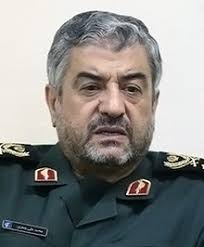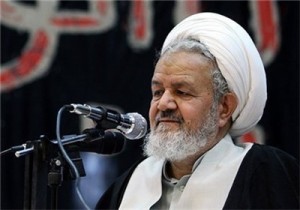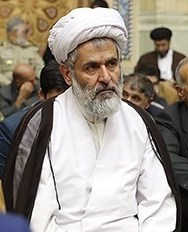June 28, 2019

IranWire has posted three videos in which senior Pasdar officers appear to hint that they manipulated the 2009 presidential election to make sure that Mahmud Ahmadi-nejad would be re-elected.
The election has been a point of controversy for a decade with many, if not most, Reformists—including both 2009 Reformist candidates, Mir-Hossain Musavi and Mehdi Karrubi—insisting the ballot boxes were stuffed. The final published results showed Ahmadi-nejad winning big with 63 percent of the vote, followed by Musavi with 34 percent, Mohsen Rezai with 2 percent and Karrubi with 1 percent.
There were numerous protests after the results were announced. An unknown number died. The regime never published any death toll, but a committee set up by Musavi and Karrubi published the names of 72 people it said were killed in the violence.

The debate over the honesty of the published results continues to today. However, the Reformist who ran elections when Mohammad Khatami was president said there was no way the regime could falsify so many votes and he believed Ahmadi-nejad was legitimately re-elected. Furthermore, all the major polls taken by foreign organizations showed Ahmadi-nejad far in the lead before the balloting.
Three videos of speeches given by leaders of the Pasdaran before closed meetings of the group were published in full June 12 by IranWire on its website.
The videos are speeches by Major General Mohammadi-Ali Jafari, then commander-in-chief of the Pasdaran, Ali Saeedi-Shahroudi, a clergyman who was the representative of the Supreme Leader to the Pasdaran in 2009, and Hossain Taeb, then-commander of the Basij.

. . . all spoke of their fears of Ahmadi-nejad losing the election
Reformists and Green Movement supporters say these videos contain proof that security agencies, and especially the Pasdaran, worked to prevent the victory of Musavi and Karrubi in the 2009 election.
IranWire says, “At the least, they appear to reveal that the [Pasdaran] played a significant role in manipulating the election process.”
IranWire says the speeches by Jafari and Saeedi seem to have been delivered a few weeks after the election, at the same time and venue. Their audience was likely to have comprised leading Pasdar officials, alongside “political guides” responsible for communicating guidelines, slogans, and ideological policies to other Pasdaran and paramilitary affiliates.
In his speech, Saeedi says that the Pasdaran’s mission involved “raising consciousness” and “guiding the public vote” to “choose what is better.”
Jafari said “revolutionary forces” were troubled by the possibility that “counter-revolutionary” forces would return to power. He said the polls showed a worrying slide in support for Ahmadi-nejad, falling below 50 percent just 10 days before the election.
“Everybody saw that if things continued in this way, the election would lead to a second round,” because no candidate would have a majority, he tells the audience. “It was not clear what the result of the second round would be.”
Jafari then says the popularity of Ahmadi-nejad rose to 63 percent, his vote total on election day, over just a few days.
“It became a little difficult to analyze the situation because it was complicated, and still many officials and some religious authorities are ambiguous about what happened,” he says mysteriously.
Jafari and the others never claimed to have stuffed the ballot boxes or to have done anything illegal. But there is an underlying boast that they did something to bring victory to Ahmadi-nejad and defeat to the Reformists. It is, of course, possible that they were just trying to impress lower-ranking officers with their claimed skill and capability.
Jafari claimed that 10 million “silent voters” from opposition groups changed the outcome of the election by voting for Ahmadi-nejad, since he was known as an “opposition figure.” The general fails to explain why the incumbent president would be considered part of the “opposition” when, according to Jafari himself, he was the favored candidate of the Supreme Leader.
Addressing the crackdown on the protests, Jafari refers to a speech by Ayatollah Khamenehi on June 19, 2009, one week after the election, in which he effectively ordered a crackdown. After the speech, Jafari says, “It was quite natural that we must not allow demonstrations, even quiet ones.”
Following the start of the crackdown, the Islamic Republic predicted the protests would continue for a day or two. But “nothing more happened after the encounter in the afternoon of Saturday, June 20,” Jafari said.
The demonstrations ceased because the protesters were frightened, Jafari adds with a smile. This is because most of those who were taking part came from affluent northern Tehran and “were not much into hardship, resistance and so on.”
Actually the protests continued for many months, even into the next year, although they were of declining size, frequency and impact.
Two “fundamental and strategic actions” were effective in ending the protests, concludes Jafari. One was the policy of arresting opposition leaders, activists, and “ideologues,” which was carried out by the security agencies, Pasdaran and Basij. The second was the severing of communications and the disruption of Internet networks, cellphones and text messaging, which “upended the plans” of the protesters.
In his speech, Saeedi cites the concerns he and others had about the prospect of the Reformists winning the election. He says he communicated these worries to the Supreme Leader and that Khamenehi was aware of the Pasdar position.
“When we met [Kha-menehi], we would tell him that a victory by the Reformists was our red line,” he said.
Saeedi said, “[Some candidates believe] that legitimacy comes from the people and divine legitimacy has nothing to do with it. In other words, they want to entrust the government to somebody who believes that the powers of the [Supreme Leader] are earthly.”
Saeedi points out that Ahmadi-nejad was the Supreme Leader’s chosen candidate and a vote for another candidate was therefore the equivalent of a “no” to the Leader. This was something the Pasdaran could not accept. Khamenehi never publicly endorsed any candidate, however, and repeatedly said he had no preferred winner—although most people believed he preferred Ahmadi-nejad.
In a long speech lasting close to two hours, former Basij Commander Hossain Taeb, who is now the intelligence chief for the Pasdaran, talks about what he called the US “containment” strategy for defeating the Islamic Republic. This involved replacing Ahmadi-nejad through the 2009 election, he said.
The “maximum participation” of voters in the election was encouraged by the Western media in order to deepen divisions in Iranian society, he said. This was odd because, in every election campaign, the regime says the West tries to depress the turnout and that the final turnout, always rated as huge, proves the public supports the establishment.
The Reformist campaign headquarters was allied with foreign forces, Taeb insisted. These were reportedly telling Musavi and his campaign staff what to say, including the slogan, “Victory unless they cheat in the election.”
Taeb goes on to explain that members of the Basij rushed to the streets to control the unrest because they felt the revolution was in danger. “Considering the large scale of the protests, it was possible that Tehran would have been occupied in a velvet coup d’etat.”
IranWire says it is interesting to look at the statements by Jafari and Taeb side-by-side. Taeb says the turnout of “silent voters” who opposed the regime was the result of Western propaganda, while Jafari claims these 10 million votes went to Ahmadi-nejad.


















